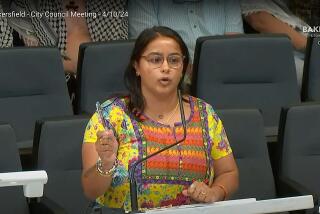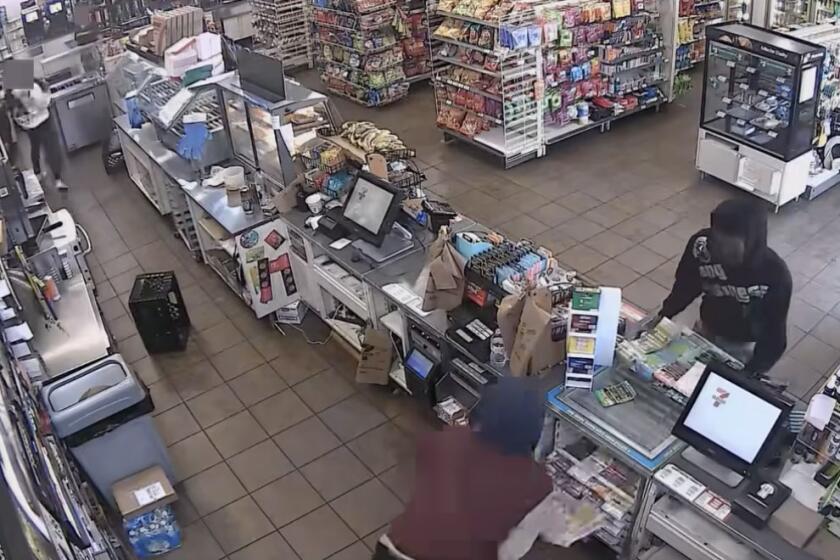Assault heightens tensions in S.F.
Mark Welsh chokes up as he describes his rape last fall and the word his two assailants kept repeating.
“They kept saying ‘faggot’ over and over again,” whispers the 51-year-old owner of a video store in the Castro district. “It went on for what seemed like forever.”
Welsh came forward about the attack to publicize sexual assaults against gay men in the Castro -- which he says police have downplayed.
His outrage helped spark a new anti-rape education program as well as volunteer citizen patrols in one of the nation’s best-known gay neighborhoods.
But because both Welsh and another rape victim say their assailants were black, news of their attacks has heightened tensions in a community that for years has been accused of racial exclusion.
In 2005, the San Francisco Human Rights Commission ruled that a Castro bar called SF Badlands discriminated against black patrons by requiring them to present multiple forms of identification before entering.
Officials now require the bar’s owner, Les Natali, to post a notice informing patrons of state anti-discrimination laws.
“It’s rare,” John Carr, spokesman for the state Department of Alcoholic Beverage Control, said of the requirement. “We wanted to send a strong message that we were going to keep an eye on them.”
Still, many African Americans say they’re made to feel unwelcome in the Castro. “There’s an unspoken language, whether you’re a black man or woman, that there’s no space for you here,” said Lisa Williams, a local activist who is black.
“When you go to a bar, you get the feeling that the prices are being adjusted,” she said. “It takes forever to get served, and the wait staff watches you like a hawk.”
African Americans recently marked the two-year anniversary of the closing of the Pendulum, the only bar in the Castro that specifically attracted black gays and lesbians. Natali bought the establishment in 2005 -- and closed it for renovations. It has yet to reopen.
“We continue to fight the perception blacks are not wanted or aren’t a part of the gay community,” said Bill Doggett, who in February founded a monthly mixer for African American men.
Some worry that the citizen patrols could lead to racial profiling and vigilantism. “When you have a bunch of white men patrolling an area that has recently expressed alleged hostility toward African Americans, one would hope they would tread lightly,” said Billy Curtis, a human rights activist.
Castro Community on Patrol members say race isn’t an issue. “We’re about safety,” said co-founder Carlton Paul. “We’re here to protect what’s ours.”
Still, both Castro residents and police acknowledge that people have yelled slurs at blacks on neighborhood streets.
“The gay community has enough opposition from the outside,” said Lisa Frazer, a San Francisco police officer who patrols the Castro.
“It saddens me to see the infighting. But the Badlands thing has not been forgotten. It cut very deep. The wound is very much still there.”
Welsh has also criticized police as being slow to investigate his crime. Officers say Welsh was late reporting the attack and disposed of evidence, hampering the inquiry.
Welsh admits that after the attack, he threw away his clothes and showered. “I got in and scrubbed like you thought you were taking the skin off,” he said. “It was like the movies: You think this doesn’t happen. But it does.”
He was embarrassed to report it, he said. “It’s stupid, but I’m supposed to be butch, the tough guy, and here I am getting the crap kicked out of me,” he said.
Experts say many gays do not report rapes. “Mark Welsh is a community businessman with a good relationship with police, and even he struggled,” said Michael Scarce, author of the book “Male on Male Rape: The Hidden Toll of Stigma and Shame.”
“Imagine what it’s like for someone closeted with no relationship with police,” he said. “That’s one reason a majority of male survivors never seek treatment.”
Scarce said gay men face the same stigma as many women: the perception that they were partly to blame for the attack. “It’s the myth of the hypersexual homosexual,” he said. “If someone is always having sex and wanting sex, how could he possibly not consent?”
Welsh says it took weeks for police to publicize eyewitness sketches of the suspects. “Had I been a white woman with two kids, they would be all over it,” he said. “Instead, I feel like a second-class citizen because I’m gay. There’s no DNA evidence, but this is still a case. I can still ID the bastards.”
San Francisco police say all crimes are taken seriously. “Race, gender; they don’t come into play,” said Lt. Dan Leydon of the department’s sex crimes unit. “A victim is a victim. In this case, with no physical evidence, no witnesses and no other leads, the case goes cold.”
Last month, the city began a gay rape awareness campaign that includes public ads showing a man huddled in bed over the caption: “I thought he was a great guy ... until he raped me.” A recent report by Community United Against Violence, a nonprofit advocacy group, suggests that “sexual assaults against gays [have] emerged as an alarming trend.”
Nine cases of gay sexual assault were reported in San Francisco in 2006, but the number for 2007 had hit 18 by June. Most were casual encounters that turned into violent assaults, but some have been street attacks by complete strangers, police say.
So far this year, only two people have reported being sexually attacked in the Castro and none of the suspects appeared to be African American, police say. Gay rights organizations estimate that about 58,000 gay men and women live in San Francisco, a city of 700,000 residents. The numbers include 4,500 African American gay men and women.
Still, in the Castro the perception persists that black males are often responsible for crime.
“There’s the typical stereotyping,” said Jovida Guevara-Ross, executive director of Community United Against Violence. “Young blacks are dismissed as thugs, gang members who aren’t welcome in the Castro.”
Members of Castro Community on Patrol insist they don’t want to add to racial stereotypes. The 50 steady volunteers do not intervene in incidents they encounter but will act as witnesses and alert police, organizers say.
One night, three volunteers in orange windbreakers walked the streets in the fog, handing out security whistles and good cheer. “We’re not vigilantes,” said Dan Alexander, 46, who along with his partner has volunteered half a dozen times for the patrol.
Taking notes on suspicious cars, they saw a woman huddled in the darkness. “How ya’ll doing?” drawled volunteer Kenny Ray King. “Everything all right?”
They offered a whistle to one man. “I need everything I can get,” he said. “I’d use a gun for protection if I had one.”
Welsh says he feels bad over the racial fallout in the Castro.
“These days, you’re not supposed to mention race, but you know what? If the attackers were purple, I still would have come out. I didn’t ask to be raped.”
More to Read
Start your day right
Sign up for Essential California for news, features and recommendations from the L.A. Times and beyond in your inbox six days a week.
You may occasionally receive promotional content from the Los Angeles Times.







